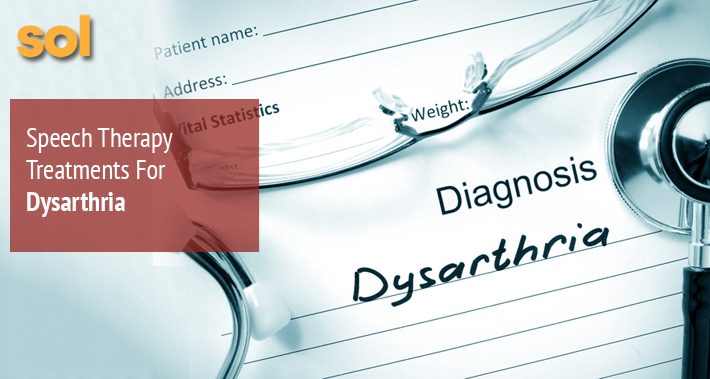
Do you have trouble speaking due to issues controlling the muscles that form your words when you talk?
If so, this is a sign you may have dysarthria.
So many people take for granted the ability to communicate, and it’s important to be able to keep up with those around you.
Fortunately, if you have dysarthria, there are techniques out there that can help you improve your speech.
If you developed dysarthria later in life, whether from an injury or a later onset condition, our adult speech therapy clinic here at Sol Speech And Language Therapy can help.
On the other hand, if it’s your child who has dysarthria, perhaps because of a congenital condition, we also offer speech therapy for children with dysarthria.
Whatever the origin of your dysarthria, we’re here to help you navigate it.
Let’s take a closer look at dysarthria – what is it, what causes it, and how speech therapy can help.
What Is Dysarthria?
Caused by muscle weakness, dysarthria is a common speech disorder that can make talking difficult.
Dysarthria can make it harder for people to understand your speech.
This disorder is usually caused by nerve damage.
Diseases that affect the nerves that control your muscles, called neuromuscular conditions, are often what lead to dysarthria.
Your lips, mouth, tongue, and face all have muscles that affect your speech.
There are certain muscles involved in creating speech and if they’re paralyzed or weakened you could have trouble creating the sounds you need.
Dysarthria can be mild or severe.
How Do You Know If You Have Dysarthria?
There are a variety of signs that you might have dysarthria.
They include:
- Speaking more slowly or quickly than you want to
- Mumbling or slurring speech, making you harder to understand
- Choppy, robotic speech
- Difficulty moving the muscles in your lips, tongue, or jaw
- Soft speech
- Voice changes (like your voice being newly hoarse)
- Voice that is nasal or breathy
You might notice that some of these symptoms are similar to other speech disorders.
Particularly aphasia, apraxia of speech, and dysphagia.
But treatment for each of these is different.
Your speech therapist will work with you to discover what’s at the root cause of your symptoms.
Are There Different Types Of Dysarthria?
The type of dysarthria you have depends on what’s causing it.
You could have central dysarthria, which is caused by a traumatic brain injury or stroke.
Otherwise you might have peripheral dysarthria, which is what happens when the organs you use to speak are damaged.
Your dysarthria might have been present since you were born, which is called developmental dysarthria.
An example of a condition that would cause dysarthria before birth is cerebral palsy.
On the other hand, acquired dysarthria happens later in life.

What Is Dysarthria Caused By?
If something can cause brain damage, it can cause dysarthria as well.
Certain illnesses, injuries, or neuromuscular diseases can cause central dysarthria, while peripheral dysarthria is often caused by damage to speech organs.
Some things that may cause dysarthria include:
- Surgery to the tongue or neck
- Being born with structural anomalies
- Parkinson’s disease
- Multiple sclerosis
- Cerebral palsy
- Traumatic brain injury
- Dementia
- ALS (Amyotrophic lateral sclerosis) a.k.a. Lou Gehrig’s disease
- Huntington’s disease
- Muscular dystrophy
- Medication side effects
- Brain tumors
Can Speech Therapy Help With Dysarthria?
If you or a loved one has dysarthria, speech therapy can help.
Your speech therapist will focus on helping you slow down your speech and improving your volume.
They’ll give you exercises for moving your tongue and lips so the muscles get stronger.
They may also incorporate breath training so that your voice strengthens.
Your speech therapist will help you to form sounds more clearly so they can be better understood by others, and movements for chewing and swallowing.
They’ll also help you find alternatives to speech that may assist your communication, like augmentative and alternative communication (AAC).
How To Communicate With Somebody With Dysarthria
If you know someone with dysarthria and want to support them, it’s good to know how best to communicate with them.
It’s good to talk somewhere quiet where you can more easily hear each other.
Do your best to pay close attention to them as they speak.
If you miss something, repeat back what you did hear so they don’t have to repeat everything they said.
Yes or no questions can be key – then it’s not a strain on the person speaking.
Tell the person you’re speaking to if you don’t understand, and if you keep having difficulty you can suggest that they write something down or draw a quick diagram.
Book Your Appointment With Sol Speech And Language Therapy Today
If you have dysarthria, you don’t have to go through it alone.
At Sol Speech and Language Therapy we’re here to help you feel more understood by those around you.
Build up your speech confidence and book your appointment with Sol Speech and Language Therapy today.
6448 E Hwy 290 Suite E-108,
Austin, TX 78723
(512) 368-9488
» https://g.page/r/CfRfhOpEQm7BEAE
Sol Speech & Language Therapy
555 Round Rock W Dr E-221,
Round Rock, TX 78681
(512) 808-3953
» https://g.page/r/Cb5pwCTosSEfEBM
Sol Speech & Language Therapy offers personalized skilled intervention to those struggling with their speech and language skills. Services offered include screening, consultation, and comprehensive evaluation. We also provide one-on-one and/or group therapy for speech sound disorders, receptive/expressive language delay/disorder, stuttering/cluttering, accent reduction, and much more.